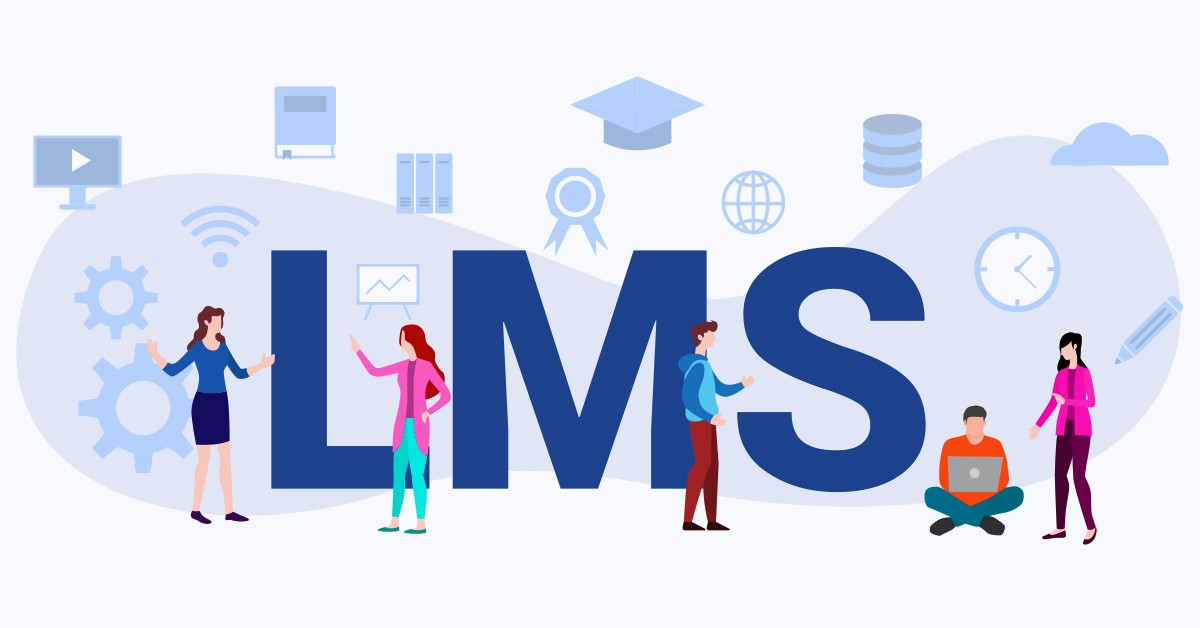
In an era where knowledge is the new currency, and upskilling has become an unwavering necessity, finding the right strategy to foster learning in an enterprise setting is akin to finding the Holy Grail. How do modern businesses ensure a culture of continuous learning, thereby fostering innovation and competitive advantage? The answer lies in a comprehensive Enterprise Learning Management System (E-LMS).
Imagine a world where employees take charge of their own learning journey, continuously adapting to new challenges, and spearheading innovation - sounds ideal, right? This is the transformative power an enterprise ELMS holds. As we navigate this article, we'll deep-dive into the operational dynamics, benefits, and overall significance of implementing an learning management systems within an enterprise setting.
According to a study from Global Industry Analysts, the global eLearning market is projected to reach a staggering $458 billion by 2026, with Learning Management Systems playing a pivotal role in this dramatic growth. The increasing adoption of such systems is not just a mere trend, but rather a strategic move by enterprises around the globe to drive efficient learning, enhance employee performance, and ultimately, fuel growth.
The role of an LMS extends beyond just being a digital platform for learning materials - it's a veritable powerhouse designed to manage, track, and amplify enterprise learning. It is a vehicle to knowledge that drives engagement, bridges skill gaps, and turns the wheels of progress.
Join us as we traverse the terrain of enterprise learning, uncover the nitty-gritty of LMS, and help you navigate towards a future where learning and growth are intrinsic to your organization's DNA. Welcome aboard.
What is an Enterprise Learning Management System?
An enterprise learning management system is a centralized platform designed to manage, track, and facilitate employee training and activities within an organization. It is an essential tool in the arsenal of any enterprise seeking to cultivate a workforce that is continually growing, learning, and evolving.
Not only does an enterprise LMS offer a structured avenue for the dissemination of necessary training materials and courses, but it also helps in tracking individual progress, providing resources as needed, and ultimately enhancing productivity.
The Purpose of an Enterprise Learning Management System
Have you ever encountered a situation where an essential skill is missing within your team, and you have to resort to costly external resources or consultants to fill the gap? Or perhaps there are instances when critical company updates are disseminated via lengthy emails that often go unread, resulting in miscommunication and confusion. These scenarios are all too familiar in the corporate world and point towards an urgent need for an effective learning solution.
The purpose of an enterprise LMS, thus, is not merely about digitizing learning content. It's about fostering a culture of continuous learning, bridging organizational knowledge gaps, improving communication, and ultimately, building a resilient, future-ready organization. When the winds of change blow, an organization equipped with an LMS doesn't build a wall; it builds a windmill.
Let's explore a bit further on the benefits of how you too can harness the power of LMS and turn challenges into opportunities for growth.
Benefits of Implementing an Enterprise Learning Management System
An enterprise learning management system is laden with several advantages which include but are not limited to:
- Improved Productivity: By providing a structured framework for employee training, an enterprise LMS contributes to the sharpening of employee skills, which in turn improves overall productivity.
- Cost Efficiency: The implementation of an enterprise LMS can result in significant savings on training costs, thereby positively impacting the financial health of an organization.
- Flexible Learning: An LMS provides resources that can be accessed anywhere and anytime, thereby accommodating the learning needs and preferences of different individuals within an organization.
- Compliance Management: By providing a centralized platform for the management of training content, an LMS helps ensure that the organization's compliance requirements are met.
- Reporting and Analytics: An enterprise LMS tracks learning gaps and provides reporting on individual progress, thereby offering invaluable insights for improving learning programs.
E-Learning Vs. Learning Management System
While e-Learning and learning management systems are often used interchangeably, they represent different concepts in the sphere of digital learning. E-Learning refers to the use of electronic media and information and communication technologies for educational purposes. It is a way to provide training and instruction through digital means, often over the internet.
On the other hand, a learning management system is a specific tool or platform used to facilitate e-Learning. It's a system that allows for the administration, documentation, tracking, reporting, and delivery of educational courses or training programs.
In essence, e-Learning is the method, while the LMS is the tool used to deliver and manage that method.
How to Choose the Best Enterprise LMS
Choosing the right Enterprise Learning Management System is critical to aligning learning and development strategies with your business goals. Here are key factors to consider when selecting an enterprise LMS:
Usability
The interface of the LMS should be intuitive and easy to navigate. Check for different roles and permissions settings, content delivery formats, and the presence of analytical and reporting tools.
Scalability and Pricing
The scalability of the system is a critical factor to consider, particularly for growing organizations. Also, consider the pricing model and ensure it suits the number of users in your organization to avoid unexpected costs.
Compliance and Security
The platform should align with your organization's policies to ensure you're collecting data responsibly and securing sensitive information.
Features
Look for a system that offers microlearning, promotes collaboration, and comes equipped with authoring tools, testing and assessment functionalities, robust content management, reporting and analytics, localization, and third-party integrations.
The Best Enterprise Learning Management Systems to Consider
Navigating the vast terrain of available enterprise learning management systems can be a daunting task which is why we've compiled a list of ten top-notch systems that have proven to deliver value across various organizational structures and sizes.
1. LearnUpon
Imagine a world where managing and delivering training programs is as easy as clicking a button - that's the convenience offered by LearnUpon. Renowned for its scalability and user-friendly interface, LearnUpon empowers businesses of all sizes with a robust, intuitive learning management system. Its advanced features like course creation, learning automation, and seamless third-party app integration come together to create a vibrant, interactive learning environment. LearnUpon is more than a platform for knowledge delivery - it's a centralized solution that connects and supports learning, driving business growth. If you're looking for an LMS that can tie learning insights back to business impact, then LearnUpon should be at the top of your list.
2. Docebo
Docebo is a trailblazer in the learning management system landscape, harnessing the power of AI to deliver a personalized and adaptive learning experience. But that's not all. Docebo's commitment to a collaborative learning environment shines through its gamification and social learning features, fostering a vibrant community of learners who not only grow but also thrive. Its comprehensive course catalog also ensures that everyone can find their niche, aligning professional growth with personal interests. For organizations that value adaptive, personalized learning experiences, Docebo should be a top contender.
3. Litmos
In today's fast-paced, mobile-centric world, Litmos stands out as a beacon of accessibility in the realm of learning management systems. Designed with flexibility and convenience in mind, Litmos ensures that learning can happen anytime, anywhere. Beyond accessibility, Litmos also offers comprehensive tracking and reporting, allowing you to monitor and assess your team's learning progress effectively. For organizations with remote teams or flexible working models, Litmos’s combination of mobility, ease of use, and feature richness makes it an excellent choice.
4. Adobe Captivate Prime
Enter Adobe Captivate Prime - an LMS that goes beyond traditional learning management to foster learner engagement and retention. Its fluidic player is a game-changer, delivering a seamless playback experience for virtually any eLearning content. This means no more compatibility issues - just smooth, uninterrupted learning. If your organization is all about providing an immersive learning experience that embraces a wide range of eLearning content formats, Adobe Captivate Prime is a prime contender.
5. TalentLMS
At the heart of TalentLMS is the belief that training should be simple yet effective. This shows in its clean, intuitive interface and powerful feature set. From automated notifications to easy course assignment, TalentLMS takes the hassle out of administering a training program. What makes TalentLMS truly special, though, is its emphasis on customization. The ability to create custom reports and design branded learning portals ensures that every learning experience aligns perfectly with your organizational needs. For businesses that value customization and straightforward, efficient training administration, TalentLMS is a standout choice.
6. Moodle
As an open-source platform, Moodle offers the unique advantage of endless customization and integration possibilities. Yet, the core essence of Moodle lies in its dedication to creating a dynamic and collaborative learning environment. From discussion forums to wikis, Moodle's interactive features foster communication and collaboration. Also, its scalable nature makes it suitable for institutions of any size, from small businesses to large universities. If you're seeking a solution that promotes interactivity and is customizable to unique needs, Moodle could be the perfect fit.
7. Canvas
Canvas makes a striking first impression with its streamlined, modern interface. It caters to the needs of the modern learner, offering a mobile app and allowing offline access to course content. It also supports a variety of content types - text, video, and interactive media - creating a rich, multi-modal learning experience. But Canvas doesn't stop at delivering great content - its analytics tools provide actionable insights to improve learning outcomes. For organizations aiming for a balance between modern learning experiences and insightful analytics, Canvas is worth considering.
8. Cornerstone OnDemand
With its rich feature set, Cornerstone OnDemand stands tall among its peers. It offers robust talent management functionality alongside the LMS, a rarity in the field. Its predictive analytics engine leverages data to provide actionable insights, helping organizations shape learning strategies that truly make a difference. If your organization values data-driven decision-making and seeks a comprehensive solution that blends learning and talent management, Cornerstone OnDemand deserves your attention.
9. SAP SuccessFactors
SAP SuccessFactors shines in its holistic approach to learning management. It understands that learning is part of a bigger picture - employee engagement, performance, and ultimately, business success. Hence, it doesn't just provide an LMS - it offers a suite of tools to manage and optimize every stage of the employee lifecycle. If you envision an integrated approach to managing learning and talent, where each piece supports the other, SAP SuccessFactors is an ideal candidate.
10. Blackboard Learn
Last but not least, Blackboard Learn - an LMS that’s been championing education technology for decades. Recognized for its flexibility and robust functionality, Blackboard Learn supports everything from course creation and delivery to community engagement and analytics. Notably, it provides a highly interactive platform where learners can have immersive experiences such as virtual classrooms and discussion boards. For organizations that are seeking a comprehensive, flexible, and engaging solution for their learning needs, Blackboard Learn is a venerable choice.
The Role of a Knowledge Base in Supporting an Enterprise LMS
The success of your enterprise learning management system relies heavily on how effectively the system can be adopted by its users. A knowledge base is an essential tool in supporting this process and enhancing the overall functionality of your corporate LMS. It serves as a centralized repository of information that can facilitate seamless navigation and use of the LMS.
Enhancing User Understanding
An LMS can come with an array of complex features and functionality. A knowledge base serves as a guide, offering in-depth articles and tutorials about how to utilize the system optimally. From setting up a course to running reports, the knowledge base can provide step-by-step instructions that empower users to harness the full potential of the system.
Providing Round-the-Clock Support
In a globally distributed enterprise, users may need assistance at any hour. A comprehensive knowledge base can provide answers to common questions and troubleshooting guidance, reducing the dependency on live support. This 24/7 access to support information can significantly improve user satisfaction and the overall LMS experience.
Streamlining Onboarding
When implementing a new LMS, onboarding users effectively is critical. An intuitive knowledge base can significantly streamline this process by providing resources such as user manuals, video tutorials, FAQs, and best practices. This enables users to get up to speed quickly, leading to faster adoption rates and productivity.
Driving Continuous Learning
A dynamic knowledge base isn't just a support tool – it's a learning resource. With regular updates and new content, it encourages users to explore different features and functionalities of the LMS. This promotes continuous learning and encourages users to leverage the LMS to its full capacity.
Empowering Self-Service
Today's learners prefer self-paced, on-demand learning. A knowledge base caters to this preference by offering resources that users can access and learn from at their convenience. This self-service capability can lead to higher user engagement and a more satisfying learning experience.
Wrapping Up
Navigating the world of enterprise learning management systems can seem complex, but it need not be an overwhelming task. The right LMS can transform your organization's learning culture, foster employee growth, and significantly drive your business objectives. But remember, the effectiveness of an LMS is significantly amplified when complemented by a robust Knowledge Base.
Remember, selecting an enterprise LMS isn't a one-time event but a continuous process of learning, adapting, and evolving to meet your organization's needs. Consider the options carefully, assess their alignment with your goals, and choose an LMS that's scalable, user-friendly, and equipped with the features your organization requires.
Now that you have a deep understanding of enterprise learning management systems and their benefits, it's time to ensure that your LMS reaches its full potential. This is where a top-tier knowledge base software like Helpjuice comes in.
Helpjuice is renowned for its easy-to-use interface and powerful search capabilities, making it a perfect companion to your LMS. With features like customization options, detailed analytics, and multi-language support, Helpjuice can help you create a comprehensive knowledge base that complements your LMS and supports your employees' learning journey.
Start your free trial with Helpjuice today and witness the transformation in your learning management experience. Unlock the power of effective, efficient, and engaging learning with Helpjuice. Your learners, and your business, will thank you.





